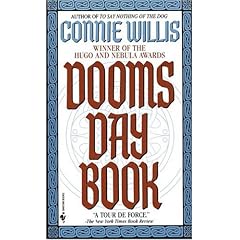On the advice of my brother, I bought this paperback. He knows that I often wonder how long I could survive if I magically time-travelled to the medieval days. Could I teach the medievals some basic science that would vastly improve their lives before they burnt me at the stake for being a godless heretic? Could I convince a king to turn his energies to making sure his subjects were literate, rather than waging war on his neighbors, or would he have me executed for spreading the dangerous idea that monarchs are answerable to their subjects?
The book is 578 pages long. It took 6 years to write. The front cover quotes the NY Times saying it’s a “tour de force”. It won the Hugo and Nebula awards in 1992, which would make you think it’s a great book. What a fool you’d be to think that! It stank worse than a 7th grader’s gym shorts.
The book is basically the story of a grad student historian in the year 2050, who goes back in time to study medieval life in 1320. But as soon as she goes through the “net” to the past, the net operator suddenly collapses with a highly infectious disease. They’re supposed to re-open the net in 2 weeks to bring the historian back – but with the university quarantined and no other net operators available, what are they going to do? She’ll be trapped in the past forever! Meanwhile, the historian arrives in the past with a similar debilitating infection. Now she can’t remember where the drop point was, so how’s she going to get back to it for the rendezvous in 2 weeks?
OK, so far, that’s a decent plot. But here’s where it all goes wrong.
– The net operator collapses on page 24.
– The historian is clearly ill on page 80.
AND THEN NOTHING ELSE HAPPENS FOR 310 PAGES!!!!
Folks, I’m not exaggerating, it’s 310 pages of the university staff going back-and-forth to hospitals trying to figure out what the disease is while their phones keep malfunctioning, intercut with the historian girl spending all her time in bed trying to figure out how to ask someone where she was found without blowing her cover. Holy cow. What’s your reward for slogging through these 310 pages of boredom? NOTHING. The plot doesn’t move forward. The characters don’t develop. All we get is boring minutae.
Here’s the rules you broke, Connie Willis. Pay attention.
-
1. Your protagonist must be active. They drive the story. Having the historian laid up in bed for 200 pages doesn’t make them active!
2. Have meaningful conflict in your book! “I forgot where the drop is” carries you for a chapter or two –
not for 310 pages. Especially when your audience suspects that your historian might not be so bummed about spending her whole life in the time period she’s obsessed with.
3. Write characters we care about. I don’t care about the professor because he is a 1-dimensional character. So is the historian… and the doctor… and the medieval people… and everyone else around them! They are cardboard people. So I don’t really care if they get what they want in the story.
4. Don’t tell me how to feel by having the characters think it. If someone says something dumb to the professor, Willis invariably writes “how stupid, he thought.” Really? I know it was stupid! You don’t need to have your character think it for me to know it. Give me some credit, lady!
FINALLY, around page 367, we finally confirm what the professor has been worried about this whole time (something the audience has been praying for…) The historian didn’t get to the right year. In fact, she’s 20 years late – right when the Black Plague was roaring across Europe. Holy cow! She’s in the middle of the plague with no medicine and people are gonna start dropping like flies – that’s cool! But really, you’re gonna make me wait 310 pages for that? At page 367, I DON’T CARE BECAUSE I GOT BORED IN THE MIDDLE 290 PAGES!!!! I WANT THEM ALL TO DIE SO THIS BOOK WILL END!
Which leads us to rule 5, which is very similar to rule 2:
-
5. Have meaningful AND CONTINUAL conflict in your story! Don’t introduce your little conflict (“I don’t know where the drop site is”) on page 80 and think you’re covered for the rest of the book. Your real punch-in-the-gut conflict didn’t show up until page 367 – “I’m surrounded by people with the plague and we have no medicine!” That should have happened a lot sooner – maybe around page 150? And in between these 2 mini-revelations, each scene needs to have some real tension in it. I can only read about how hard it is for little Ms. Historian to talk without coughing a few times before I lose interest. Or how Mr. Professor keeps trying to dodge one student’s stereotypical protective mother. And you played these games for… how many pages?
This book should have topped out at around 250-300 pages. Those would be pages of regular-size type, thank you, not the itty-bitty type your bloated tome currently uses.
In very un-Goldman-like fashion, I actually STOPPED READING THIS BOOK. It’s true. There’s very few books I have started and not finished, so it takes a lot to get on this list. You made it, DOOMSDAY BOOK.
Please allow me to suggest a good tool to help you with your next work, Connie Willis. Study it hard if you want a 2nd chance from me.
PS – actually, I’m lying. There’s nothing Connie can do to get a 2nd chance from me. Even if she memorizes STORY cover-to-cover.







 Or was it this one?
Or was it this one?